You saw that one already; a visitor drove off a cliff in Hawaii with their car in the middle of the night. For years, Hawaii has grappled with its plan to enact legislation to secure reimbursement for hikers who venture off established trails and require rescue assistance. While driving off a cliff was not envisioned in the legislation, it falls into the same general category when a heroic rescue is involved. Fortunately, the visitor is still alive and well, and so is new legislation for who pays for Hawaii emergency services.


One of the proponents of reimbursement, State Senator DeCoite from Maui, said, “I want to see a law in place so people understand we cannot keep inundating our emergency services due to recklessness by those not willing to stay within their limits.”
The focus is mainly on hiking rescues, at least at this time. There are about 1,000 of these yearly in Hawaii, with the cost burden on the taxpayers. DeCoite said this is needed now, especially due to the state’s budgetary constraints, such as Hawaii travel becoming constrained.
Both the Hawaii Senate and House are currently working through bills and seeking support. There is a sense that such a bill may finally become law this year, even after it failed in 2023.
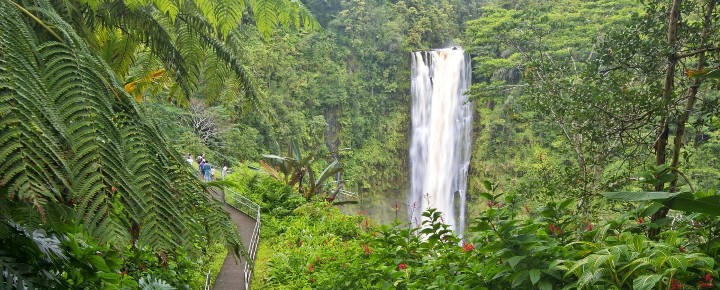

Another point of view is that this could deter necessary rescues.
Concerns raised include the potential for deterring those in distress seeking necessary rescues. One legislator, Sonny Ganadan, said in that regard, “I think the small amount of money the government might be reimbursed for is outweighed by the safety issues brought up by similar bills before.”
On the other hand, some states can navigate that problem by only charging the most egregious offenders for rescue. New Hampshire, for example, which first pioneered search and rescue reimbursement, is said to back-charge only about 10% of those rescued. So that begs the question of whether it is even worth it.
But in that way, perhaps reimbursement laws can be both a deterrent to bad behavior and not deter rescue in emergencies where it is needed. Following New Hampshire’s lead, at least six other states have implemented visitor rescue charge-backs.
Some of the most challenging places have included Queens Bath on North Shore Kauai, where countless visitors have been rescued from the gated, infamous Instagrammable site.
A Big Island visitor was saved from falling 400 feet while trespassing.
In that incident, a visitor climbed a fence, slipped and hung from the edge, and almost fell 400 feet. A well-meaning person risked life and limb and was able to save the visitor but didn’t even receive a thank you for the rescue.
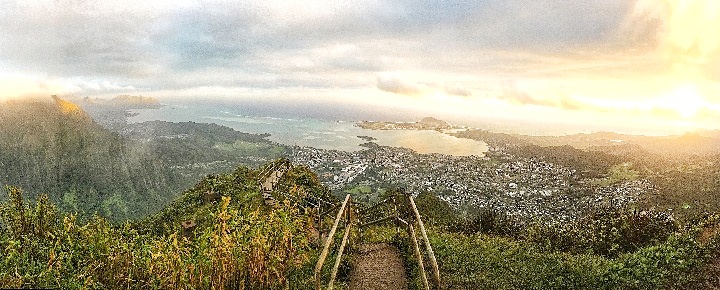

Famed Haiku Stairs trespassing will lead to its demolition.
The iconic mountain trail, the Stairway to Heaven, has experienced a plethora of illegal trespassing. The 4,000-Koolau mountain range stairs dating back to WWII are set to be demolished this year. While climbing the stairs has been illegal for 35 years, trespassing has continued unabated despite fines of up to $1,000.
The Hawaii visitor who almost died driving off a cliff at 3:30 a.m.
While not directly related to the hiking rescue reimbursement bills, it was a harrowing incident that reminded us about taking appropriate caution in Hawaii. A 27-year-old visitor from Canada nearly died after his Hawaii car rental flew off a 60-foot cliff in the South Point area of the Big Island during the middle of the night last weekend.
He was luckily helped by a fisherman in the area who saw the incident and called emergency responders from the U.S. Coast Guard and the fire department. The social media photo shows that the Jeep landed invertedly on jagged boulders below. He climbed out the passenger door, plummeting into the water below and was swept out into the open ocean.
The injured man was found struggling in the water roughly 100 yards from shore. A Coast Guard helicopter lifted him to safety. He was miraculously found to have only minor injuries but was nonetheless taken to the hospital.
This alarming incident reminded us of the dangers of navigating unfamiliar terrain here in Hawaii.
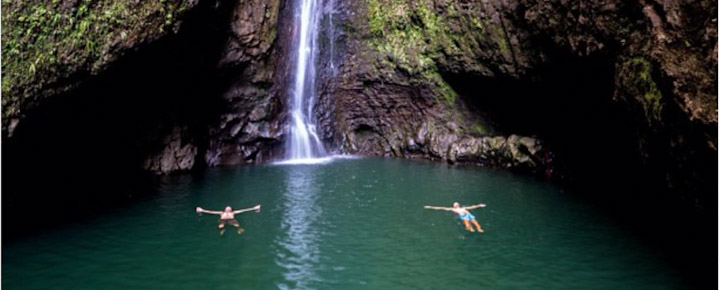

Final thoughts on Hawaii visitor safety.
Remember that the ocean, for one, is more powerful than you. Also, treat the environment surrounding it respectfully, obey warning signs, and be aware of dangerous and changeable conditions. Please don’t trespass on Hawaii hiking trails, plan hikes in relation to your ability, come prepared, and stay safe. Have a great time in Hawaii, and return again.
What are your thoughts on who pays for rescues, especially under dangerous and illegal circumstances, such as trespassing?
Get Breaking Hawaii Travel News
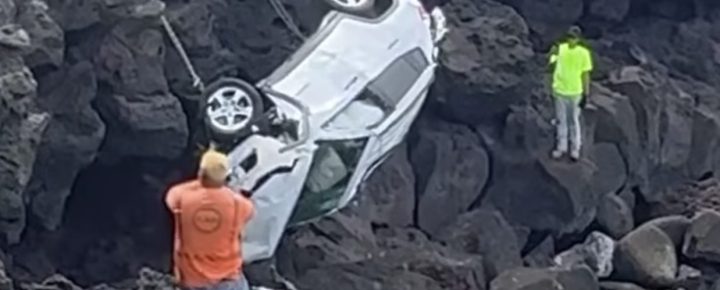

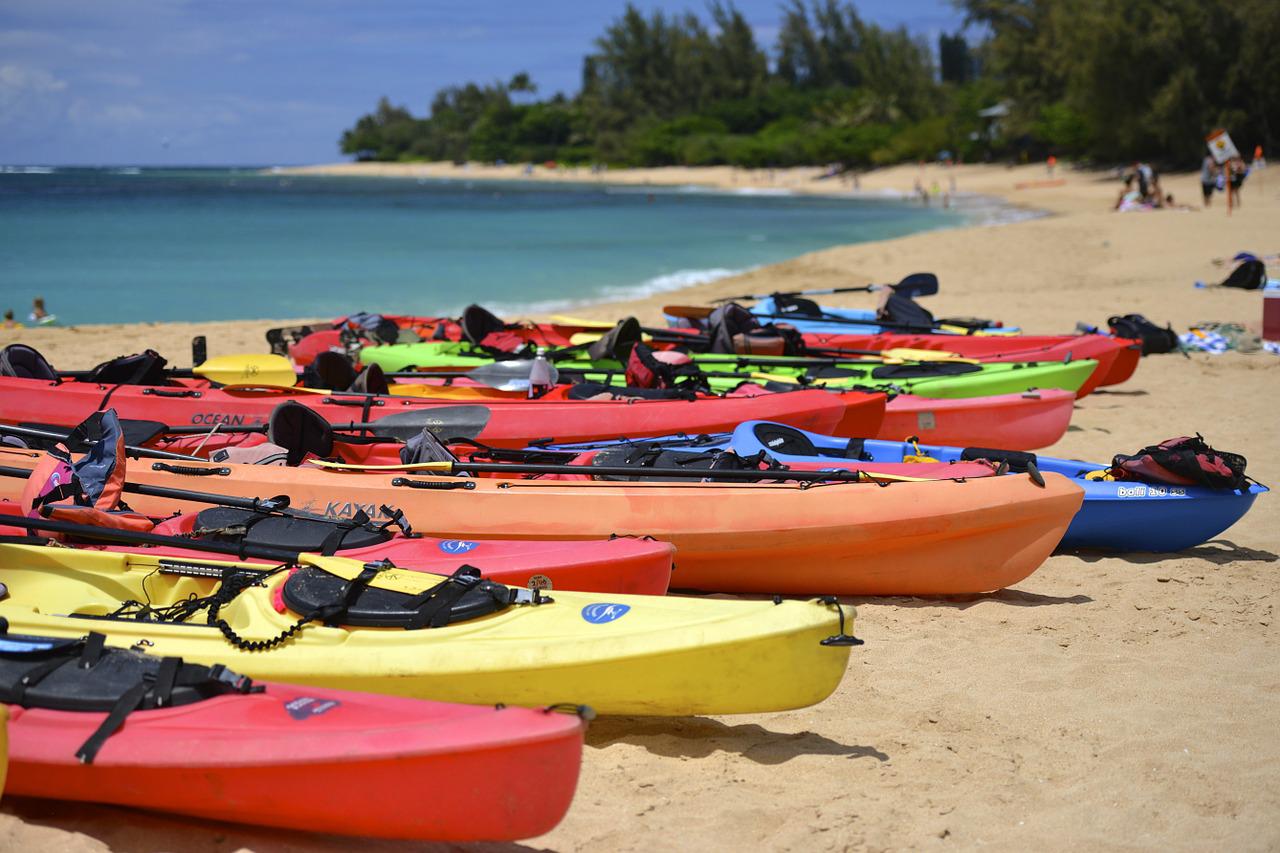


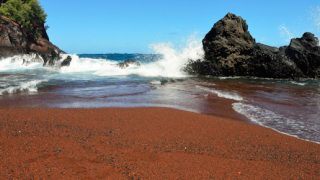

I just bought a piece of land at Highway 11 in Ocean View, HI, what should I do with it?
Whether to charge for rescues, I have mixed emotions. If it’s egregious, and clearly the visitor ignored keep out or safety signs and got into trouble, yes, they should be charged. But, if it was just a normal accident or lost situation, do not charge. Here in southern CA (at least in some parts), they will not charge for rescues in any circumstances for the very reason that, they don’t want people not calling for a rescue when needed, fearing the cost. Failure to call for a rescue could lead to death.
Maybe they should think about that before they do stupid things!! We’re not talking about regular traffic accidents, or random incidents. This is about people completely ignoring signs, warnings, etc,!!! Those people need to pay for their stupidity and ignorance. I guess they no more common sense @ po ting!!!
Here in Arizona, we have the “Stupid Motorist Law”. If one tried to drive through a flooded road or creek and gets stuck. They are fined as well as I believe charged for the rescue.
There are too many people out there with absolutely no common sense. When they eventually need to be rescued because of their stupidity, they need to pay the cost to be rescued. Why should tax payers foot the bill? Hawaii will make money with all the tourists that go there. When people go on vacation, they forget to pack their common sense.
I find it appalling that visitors can be charged for rescues in Hawaii don’t they charge enough get taxes, etc to tourists to take care of that expense? I guess Las Vegas should start charging Hawaiian tourists for misteps as well?
If the rescue is due to illegal act-charge them! Who pays anyone for doing illegal things?Why is this an issue? It should be an immediate bill to the offender.(notice I did not say victim. Offenders choose to do things-victims it happens without their choice)
As for the true victims of circumstances. Everyone knows there is a cost to things, so, there should be some way to calculate “a cost” and means to pay. No money-bill for rescue is 500 dollars-pay what you can and raise donations to cover it. there are go funds me’s all the time. just a thought
I like the 1st part of your comment, Ann (offender vs victim), but I wouldn’t be part of the fund me donations (I did donate to fire victims instead).
Can’t fix stupid !! Nuff said! Yeah, they definitely should pay!! Oh,and stay out of Hawaii!!
Waaaay ahead of you there sport. You’ve made the message very clear.
100 percent. Hold the tourist/individual responsible! In every avenue in life, people are not having to pay for their poor choices. If we don’t start holding individuals responsible for whatever they have chosen to do illegally at any age, venue, political crap, it will just keep reoccuring!
Hawaii certainly has issues that do not affect every mainland state. With that being said, many states suffer tourism and the effects of visitors. The small mountain towns of Colorado suffer much of the same issues. When people visit our state and attempt to hike a mountain that they are unprepared for, whether permitted or not, our emergency service teams rescue them. Saving a life is more valuable than the money that is lost. People who fear the expense of a rescue will often make a bad choice and suffer.
This was a tourist driving at 3:30am! Unless they wanted to drive to Haleakala to see the sunrise, what were they even doing on a road like that at 3:30am?
Earlier I mentioned the prospect of having a rando bureaucrat deciding what rescues get charged for or not based on what he or she thinks is too dangerous or risky. Your statement encapsulated that fear gloriously. If the road is open and safe at 10:00 PM, what makes it suddenly unsafe at 3:30 AM? It’s dark at both of those times. One might argue that it’s actually safer at 3:30 AM since there is less traffic on the road. Emergency services are already bought and paid for. Charging people excess is simply wrong.
I recently visited Hawaii for a month. Driving with the many tourists on the road was challenging. I fail to understand why visitors feel entitled to drive over the posted limits and rudely negotiate traffic. The tourist who drove off the cliff should look not only reimburse the state for the rescue but should additionally pay for the environmental remediation. If possible the right to drive should be suspended until a drivers safety program was completed. Tourists are not an entitled class.
Place this on a state wide ballot initiative and have the people vote on this. The people I’m sure will help pass this into law.
My thoughts…have the idiot who needs the help pay for services. As a taxpayer, why should we be burden for their bad choices that lead to high dollar rescue. The money in question should be for educating tourists and the person who is in need of service held responsible for their actions.
As a taxpayer, you’ve already paid for the emergency services. You paid for the personnel. You paid for the training. You paid for the various equipment. You pay for the ongoing maintenance of said equipment. Then, one day when you need help, you’re ok with being charged Again for services you’ve already paid for? Ok then.
Just another example of people treating Hawaiian holidays as some Disneyesque “Jungle Adventure” and not understanding just how inherently dangerous even the marked paths and trails can be even for people who are familiar with them. There’s a real reason for “off limits” notices. Those who ignore them are risking far more than a fine or rescue costs…
Best Regards
Those who do not obey the warnings should pay for the recues.
Other than extreme and obvious cases of negligence, there should be NO CHARGE to be a victim of an incident and require emergency assistance. What do you think all of that training and equipment were purchased for? Who do you think pays the cushy salaries and Cadillac (some would say exorbitant) benefits and usurious retirement benefits? All of that money to be invested into an emergency response system? For what? The fun of it? That’s What It’s There For! Now, you’re telling me, if get into an accident on your unfriendly, overpriced island and some bureaucrat is going to decide if I was being reckless or careless? Gee, how do you think that’s going to go? Unbelievable.
Aloha state? How about the Fee state? I can’t figure out where all the money that your state currently collects goes? It can’t all go to corruption, can it?? Rail costs are being fixed by fees, rescues will be fixed by fees, regular state maintenance fixed by fees. Luckily, this fall you can keep electing the same people and magically it will get fixed. What is the definition of insanity?
I think it’s a great idea. We see people taking unnecessary risks in places with clear signage. Hold them responsible.
I kind of agree, but then they will start posting signs pretty much everywhere.
Rescues should definitely be charged to the person being rescued. When you are injured and end up in the ER, you have to pay. It’s simple. If you can’t pay for an ambulance, the debt collectors start calling. I would expect a bill actually. It surprises me that the state pays for these rescues. That needs to change.
In Arizona we have a “Stupid Motorist” law. When road closures for flooding and signs posted any motorist that disobeys is required to pay all costs to be rescued.
I like the “Stupid Motorist Law in Arizona”. Let’s implement this in Maui. Regarding this story, a tourist driving off the cliff at 3:30am, should definitely pay for his rescue. Unbelievable!
So, is the same road too dangerous to drive on at Any time after dark? Is that what you’re saying? Is the same motorist allowed to drive on that road at 10:00 pm? Or is it possible that the person simply had an accident and needed assistance? What you are saying makes no sense.
I live in NH, and would like to point out that if a hiker, etc. does Not purchase a “Hike Safe” card prior to needing rescue, they are held fully responsible for the cost of the rescue. The Hike Safe program was implemented because of the skyrocketing costs of rescue – especially when it involves rescues on Mount Washington (“the worst weather in the world” and former record holder of the highest wind speed ever recorded).
It is purchased seasonally and is tantamount to an insurance policy, with a modest cost of $25 per person / per hiking season / year.
that is interesting.
I feel that visitors who go off the marked trails, those who attempt to climb Stairway to Heaven, or do anything to put themselves or others in danger should be treated differently than a tourist who drives off the road on a rainy of foggy night. One is a deliberate attempt to disobey rules or do a dangerous thing. Another is a traffic accident. That person may not be aware of that upcoming curve, for instance. Frankly, even residents could be driving off a road, day or night. It can happen to anyone.
Maybe there should be criminal misdemeanor charges tied to community service work that is completed once the costs are paid off via that service back to the community. They would just be required to complete the community services in their state. Or complete a period of jail time. Repeat offenders? Then that needs to be dealt with too harshly. There needs to be a deterrent effect in the consequences. People know they can avoid paying, but the costs hit different if they can’t avoid a warant. community service, jail time and being banned from visiting Hawaii.
Hi Guys Charge the violater!!!
I have a couple questions? Who will make the determination as to what is reckless and thus warrant a charge to the hiker? I’ve been visiting the Big Island for many, many years. During those years I’ve hiked to the summit cabin of Mauna Loa a half dozen times. I’ve also hiked the Ala Kahakai National Scenic Trail from the northern tip of the island to Captain Cooke. I did not trespass but hiking in both of those areas certainly comes with a great deal more risk than walking along the beach. Should I experience a mishap would my assumption of the risk be deemed reckless. Hawaii is already preparing to ding me with a visitor charge. Is this another one because this goose is just about out of golden eggs.
I would be inclined to lump the cost of emergency services together with infrastructure in that they’re both an added strain that visitors place on All island resources. Visitor fees and taxes should be set and based on the actual costs associated with increased maintenance of infrastructure and usage of emergency services above levels required to sustain the permanent residential population.
A law like this a no brainrr and should have been passed years ago. If signs were posted where the trespas occurs I think it would be a strong deterrent and puts the trespasser on notice. Enter at your own risk and incur the cost of rescue! Let’s do it.
Here in Colorado, you can buy rescue insurance for $3 / year. Revenues go to reimburse search and rescue teams. Its voluntary but a lot of folks buy them, supporting rescue efforts.
The state could direct a few bucks from any of several tourist taxes & fees to support rescue efforts.
Let “Darwin Rules” apply!! We can’t afford to bubble wrap everyone.
We can’t even find the money to house everyone. Lets do that first.
If illegal stuff being done ….Get all the costs back….
If it’s stupidity …..Or failure to heed warnings ……75% ….
Minimum of 50% ……for all else …..
Locals should not have to pay for someone stupidity
Those that need to be rescued need to pay! Especially those who are in areas where they are not supposed to be.
Although we see people on state sanctioned trails that get way too close to the edge in order to take a selfie and they are just lucky they don’t fall over, even State trails are not maintained well.
If a person is negligent, such as ignoring no trespassing signs or not being responsible for their own safety then I think they bare the burden of the cost of their rescue.
One question…will locals be charged for rescues when they do something stupid too? I hate to be the bearer of bad news but tourists are not the only ones who occasionally do things that are unsafe and reckless.
While this may be true… ok absolutely true.
But, existing emergency services and staffing should have a baseline budget to adequately address the permanent resident population. It’s the added strain on resources that visitors bring that becomes the funding issue.
>> It’s the added strain on resources that visitors bring
>> that becomes the funding issue
You’ve got this backwards. It’s visitors who *provide* the resources, via commercial and business activity, stratospheric taxes, fees, surcharges, etc.
And if you want the cause of resource “strain,” time to take a real hard look at (1) the resident population and (2) truly inept state and local government.
How about the $19.3 million in bribe-induced single-source contracts that were afterbirthed in Maui? Yeah, twenty million in siphoned funds buys you a *lot* of rescues — and that’s just one corruption case. Maybe focus on that.